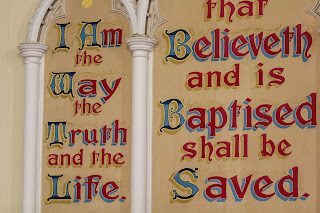Questions of truth (and love) (oh and unity...)
Jesus said to him, "I am the way, and the truth, and the life. No one comes to the Father except through me. (Jn. 14:6 ESV)
Rather, speaking the truth in love, we are to grow up in every way into him who is the head, into Christ, (Eph. 4:15 ESV)I guess I'm not the only one who has been thinking about questions of truth over the weeks and months of the pandemic. At one level, there has been a whole set of ongoing questions about truth specifically to do with the pandemic. How is the virus spread? What is the impact of wearing a mask? There have been a further set of more subtle questions about the horrendously difficult trade-offs that have to be considered in decisions, for example, of when to lock down, when to open up and what to open up. At each point the public and media have wanted to know the 'truth'. Reality has shown how difficult it is to know that truth - statistics are hard to read, science is tough to do quickly and accurately, models projecting what happens may or may not be accurate. Almost everything we have heard has had an element of provisionality about it.
But I think there have been more profound questions kicking around too. I don't know what to make of some of the statistics about people watching church services and people using Google to find out about prayer. Again finding out the truth will be difficult, but I do know friends who have felt this has been a fruitful evangelistic time. I wonder if, in part, this is because people have been stimulated to find out some more ultimate truth. We need something more solid and more certain in such uncertain times.
As Christians, we have such astonishing access to the truth in Jesus (see John 14:6). After many years now of the denigration of truth by the nonsensical postmodern movement - perhaps we have a moment to re-engage with truth.
At the same time, as a society, we seem to have lost the ability to honestly engage in discussion and debate to seek the truth. Social media shows this up to some extent, but I think it is a little more general than that. It seems to me there are two extremes here. Either people have what used to be called 'flame wars' - just angry and bitter exchanges with not much substance. Alternatively there is unwillingness to engage in an issue, better to stay friends than disagree.
At times there is a tendency for Christians to act in similar ways. Either we land on love or truth from Ephesians 4:15 - often both in the pursuit of unity. Those who land on love don't want to break relational unity - but they can follow the worldly culture of shutting down debate. Those who land on truth don't want doctrinal disunity to be hidden, but follow the worldly culture of power and one-upmanship. But a passionate love for the person means we will want to seek truth with them. And a passionate love for truth will lead us to a faith built on love for God and our neighbour. We can't land on truth or love, we must land on both. Jesus did, after all, embody both truth and love!
It seems to me that part of the witness of the church, in these troubled times for truth, will be the modelling of gracious debate that shows true love and a passion for the truth. Pointedly for evangelicals, I think we have a reputation for being hard-nosed about the truth with some and unwilling to raise the issues with others.
I can think of a context where I raised a pretty important issue of truth in a conservative evangelical context around the question of sexuality and was shut down. This was not something up for discussion and would unnecessarily trouble unity. For what it's worth, that might surprise many of my more liberal colleagues of the past, because they expect us to fight tooth and nail with them about the same issue!
However, many of us will have seen and heard and been a part of debates where there seems to be deliberate misrepresentation, unnecessary anger, lack of careful listening/reading and so on. While we don't know the hearts of others, we can, to some extent know our own and the general state of the human heart. Too often our passion for truth does not arise in a context of love for God or people (or even the truth)!
My conclusion would be simply that the difficult work of good debate is important for Christians and the church. Perhaps it is especially important now. We must be open to people being able to speak up and speak out. We must want to get to the truth and be willing to do the hard work of discussion. We will always have to check our attitudes in that and there may be times for us to bow out of particular forums and contexts because we struggle to maintain love, but we must not play love off against truth.



Comments
Post a Comment